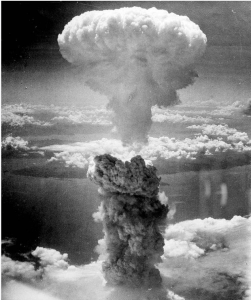The Nagasaki bomb, a tragic event etched in history, serves as a haunting symbol of the catastrophic consequences of nuclear warfare. On August 9, 1945, the United States dropped the atomic bomb named “Fat Man” over Nagasaki, bringing immense destruction and loss of life. This devastating event, occurring three days after the bombing of Hiroshima, played a pivotal role in shaping the world and highlighting the urgent need for global cooperation and disarmament.

During the final stages of World War II, the United States developed the atomic bomb as a strategy to end the conflict with Japan. On August 6, 1945, the first atomic bomb was unleashed on Hiroshima, causing unprecedented devastation. However, Japan did not surrender, prompting the deployment of the Nagasaki bomb.
At 11:02 a.m. on August 9, the Nagasaki bomb exploded over the city, resulting in widespread destruction and fires that consumed the surroundings. The death toll reached an estimated 70,000, with countless others suffering from severe injuries and radiation-related illnesses.
The bombings of Hiroshima and Nagasaki had profound global implications. The sheer magnitude of the loss of life and destruction led to a collective realization of the urgent need for nuclear disarmament and international agreements to prevent the use of such devastating weapons in the future.
Following the Nagasaki bomb, Japan surrendered unconditionally, marking the end of World War II. The destruction inflicted upon Nagasaki and the immense suffering endured by its citizens became a potent symbol of the horrors of war and sparked an international movement advocating for nuclear disarmament.
The Nagasaki bomb taught the world invaluable lessons. It served as a stark reminder of the potential consequences of warfare and the pressing need for peaceful resolutions. The bombings ignited a global conversation about the ethics of weapons of mass destruction and their long-term impact on human lives and the environment.
As we remember the victims and survivors of the Nagasaki bomb, we must continue to strive for a peaceful world free from the threat of nuclear weapons. It is imperative that we honor the memory of those affected and work towards a future where the lessons learned from this dark chapter in human history guide us towards peace and understanding.
Cite This Article
"Nagasaki Bomb: The Unforgettable Tragedy" History on the Net© 2000-2024, Salem Media.
April 29, 2024 <https://www.historyonthenet.com/nagasaki-bomb-the-unforgettable-tragedy>
More Citation Information.





